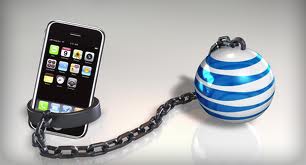|
|
Continue reading ETI Views and News at
econtech.com,
or download a
printer-friendly version.

Follow us on Twitter @EconAndTech
|
|
Do AT&T's plans for the iPhone 5 run afoul of the FCC's Net Neutrality rules?
|
|
 The iPhone 4, introduced by Apple in 2010, included an app known as FaceTime that enabled users of various Apple products – iPhones, iPads and Macintosh computers – to conduct full-screen, full-motion two-way video chats. However, FaceTime on wireless devices (iPhones, iPads) could only be used over wi-fi, and not over 3G cellular services. Apple recently announced that its next generation of iPhone, expected to be called the iPhone 5, and a new operating system for the iPhone and iPad, IOS 6, both due out in the next month or so, will provide the ability for FaceTime video chats to also be conducted over 3G/4G wireless data services.
The iPhone 4, introduced by Apple in 2010, included an app known as FaceTime that enabled users of various Apple products – iPhones, iPads and Macintosh computers – to conduct full-screen, full-motion two-way video chats. However, FaceTime on wireless devices (iPhones, iPads) could only be used over wi-fi, and not over 3G cellular services. Apple recently announced that its next generation of iPhone, expected to be called the iPhone 5, and a new operating system for the iPhone and iPad, IOS 6, both due out in the next month or so, will provide the ability for FaceTime video chats to also be conducted over 3G/4G wireless data services.
Earlier this month, AT&T announced that it would not only support FaceTime connections on its wireless data service plans, but would not even count data usage consumed on FaceTime calls against the customer's total data bandwidth allowance. But there was a catch: These benefits would be available only to those AT&T customers who signed up for family shared data plans. Moreover, not only would AT&T not provide "free" FaceTime calling to its other customers (those not on shared data plans), it would not even allow them to use FaceTime over its network at all!
That announcement, however, did not sit well with those concerned about net neutrality. Here AT&T was tying the use of a specific application – i.e., content – to a specific pricing arrangement. If you want to use FaceTime, you have to purchase the required wireless service plan. AT&T has tried to defend its position. Robert Quinn, AT&T's senior vice president of federal regulatory, stated that:
The FCC's net neutrality rules do not regulate the availability to customers of applications that are preloaded on phones, Indeed, the rules do not require that providers make available any preloaded apps. Rather, they address whether customers are able to download apps that compete with our voice or video telephony services. AT&T does not restrict customers from downloading any such lawful applications, and there are several video chat apps available in the various app stores serving particular operating systems.
Apparently, AT&T has concluded that as long as the application comes pre-loaded onto the handset by its manufacturer rather than being downloaded by the customer after the device has been purchased, the rules are different. Under this theory, a wireless handset could come preloaded with any number of apps that the carrier would then be free to restrict to specific pricing and service arrangements. AT&T's theory is certainly creative, but cannot withstand scrutiny. If an app developer offers his program directly to customers (e.g., via Apple's "app store" in the case of the iPhone), under AT&T's theory the carrier could not restrict or surcharge its use. But if the same developer made a deal directly with AT&T rather than with the handset manufacturer to have the app preloaded onto the device as sold in an AT&T retail store, then AT&T could confer a unique benefit onto that app, such as by not charging for its use, by giving it priority access to wireless bandwidth, or any other such preferential treatment.
As noted in our review of the AT&T and Verizon shared data pricing plans (Views and News, June 2012), unlike Verizon which now offers only shared data pricing to all new customers, AT&T still provides both individual and shared pricing offerings. Here, however, it has created a marketing device aimed at encouraging adoption of shared data pricing plans by limiting this important and very popular application to only those customers who have selected this pricing arrangement. Integration, either by ownership or by exclusive contract, of the service and content providers opens the door to exclusionary conduct of the type exemplified by AT&T's policy toward FaceTime. What if Comcast were to adopt similar policies with respect to NBC programming? AT&T's FaceTime scheme creates a slippery slope whose anticompetitive implications extend far beyond FaceTime. The Commission needs to prevent this from happening.
For more information, contact Colin B. Weir at cweir@econtech.com
Read the rest of Views and News, August 2012.
|
|
|
|
About ETI. Founded in 1972, Economics and Technology, Inc. is a leading research and consulting firm specializing in telecommunications regulation and policy, litigation support, taxation, service procurement, and negotiation. ETI serves a wide range of telecom industry stakeholders in the US and abroad, including telecommunications carriers, attorneys and their clients, consumer advocates, state and local governments, regulatory agencies, and large corporate, institutional and government purchasers of telecom services. |
|
|